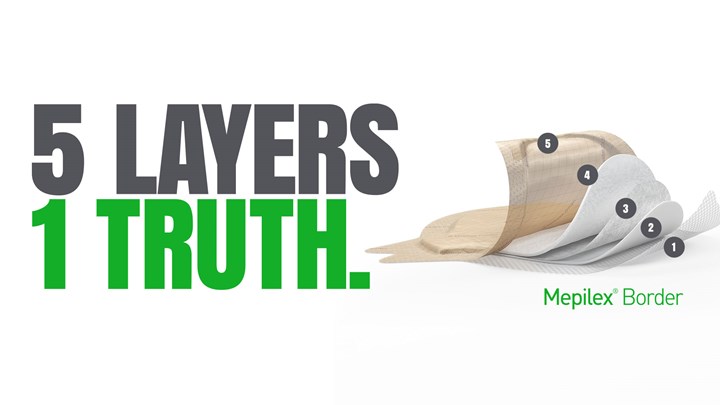Economic Evidence
Mepilex® Border is the proven 5-layer foam prevention dressing
Mepilex Border Sacrum is the only 5-layer silicone foam dressing with real-world health economic evidence in pressure ulcer prevention showing a $200,000-600,000 cost savings with $77 reduction in per patient treatment costs in a cohort of 1.03m patients.
In a recent 6-year observational study by William Padula, PhD, Johns Hopkins Bloomberg School of Public Health, published in the JWOCN the following was observed:
1. Stage 3, 4 or Unstageable hospital-acquired pressure injury outcomes were examined in 38 academic medical centers and a cohort of 1.03 million high- risk patients between 2010-2015.
2. The average AMC saw a reduction of 1 reportable pressure injury per quarter, saving 4 patients per year from serious pressure injury.
Mepilex Border Sacrum
Economic evidence
In a recent randomized controlled trial by Kalowes et al, Mepilex® Border Sacrum was associated with an 88% reduction in risk of of pressure ulcers. For an ICU department with 1,000 admissions, this pressure ulcer reduction could translate to significant cost savings.
The authors state:
"Cost savings for our health system have been significant ... Organizational estimates demonstrate that a savings of more than $1 million has been amortized in the past two years, after dressing purchase. This estimate is most likely conservative, given that the Society of Actuaries estimates the cost of treating a pressure ulcer ranges from $2,000 to $20,000 per ulcer, depending on severity. This cost savings estimate related to prevention is also consistent with other cost analysis studies of pressure ulcers."
- Donovan R, Schindler P, Weinberger J. Dollars, collaboration, and pressure injury prevention (PIP): saving upwards of a million by achieving zero. Poster presentation at Wound Ostomy and Continence Nurses Society and Canadian Association for Enterostomal Therapy, Montreal, Canada, 2016.
- Kalowes P, Messina V, Li M. Five-layered soft silicone foam dressing to prevent pressure ulcers in the intensive care unit. American Journal of Critical Care 2016;25(6):e108-e119.
- Kalowes P, Messina V, Paige R. Reducing medical device related pressure ulcers. An interprofessional approach using data & innovation to improve adult & pediatric outcomes. Poster presentation at the Symposium on Advanced Wound Care Fall, Las Vegas, Nevada, United States of America, 2014.
- Lientz J. Dollars and sense: economic value in HAPU/sDTI prevention. Poster presentation at National Pressure Ulcer Advisory Panel Biennial Conference, Houston, Texas, United States of America, 2013.
- Padula William V. Effectiveness and value of prophylactic 5-layer foam sacral dressings to prevent hospital-acquired pressure injuries in acute care hospitals an observational cohort study. J Wound Ostomy Continence Nurs. 2017;44(5):1-6.
- Santamaria N, Santamaria H. An estimate of the potential budget impact of using prophylactic dressings to prevent hospital-acquired PUs in Australia. Journal of Wound Care 2014; 23(11):583-589.
- Santamaria N, Gerdtz M, Sage S, McCann, J, Freeman A, Vassiliou T, De Vincentis S, Ng A.W, Manias E, Liu W, Knott J, Liew, D. The cost-benefit of using soft silicone multi-layered foam dressings to prevent sacral and heel pressure ulcers in trauma and critically ill patients: a within-trial analysis of the Border Trial. International Wound Journal 2013;doi:10.1111/iwj.12160.





